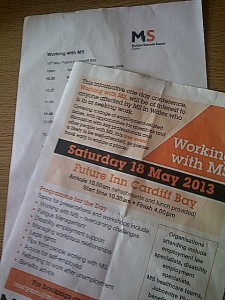 I am not, by any stretch of the imagination, a public speaker.
I am not, by any stretch of the imagination, a public speaker.
It’s something that has always terrified me.
I trace this back to moving from Scotland to Wales when I was 14, and asked to talk to my English class in a new school about some topic I was passionate about. The girl before me spoke about The Body Shop and smashed it.
I mumbled and stuttered through an excruciating two minutes and swiftly sat back down again, cheeks flaming.
Since that time, I vowed never, ever to speak to an audience again.
Until MS.
Why did MS give me back a voice I lost?
For one, accent doesn’t matter. Second, a slick speaker is all well and good, but sometimes it is just as important to hear from someone like me, an average person , saying it as it is, mumbling and pauses accepted.
During my work in raising awareness about MS, I have been fortunate enough to speak at MS conferences in Hungary, Greece and Denmark. When I say speak, I mean talking with passion to audiences, voice wavering. I always keep in mind that if I can survive a two-hour lumbar puncture by a Doctor who has never done one before on a live patient, I can survive anything (true story).
And that’s the thing about passion – at my last conference, we were talking about Patient Focused Priorities, something I’m, well, passionate about. We had all chatted beforehand, ran through some scenarios, but to be live (it was live-streamed), to be there, at the conference, for that twenty minutes, I wanted to give my all.
It could have gone either way. I blow-dried my hair (taming the unruly curls), I dressed in smart black trousers and a grey top and made my way to the conference room. I was led to a bank of dials and switches and mic’d up (bit embarrassing, muffin top). Then I sat down, heart pounding.
It seemed a good idea weeks before, so we agreed, as I was in Scandinavia, I would explain my background. In Norwegian. A language I used to speak fairly fluently until MS blasted me with a massive relapse of the speech part of my brain, which I’ve been told is quite unusual.
However, me and my wonderful Norwegian host began…
Reader, it was amazing. My Norwegian was awful (to be expected) but our rapport carried us through,
Looking back, I think it is the same for all of the conferences I have spoken at. I’m not coached, tutored or subjected to a round of interviews: I’m invited because I am me, living with MS.
I would like to think that a genuine speech about someone living with MS is more effective than any PowerPoint slideshow.
I may mumble, stumble and fumble, but I get my point across.

 I’m ever so slightly nervous.
I’m ever so slightly nervous.